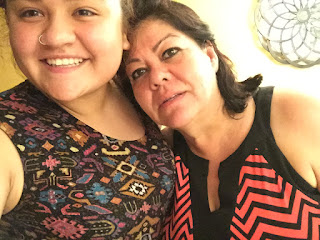 |
| (me and mentor/grandma/sara romo miranda) |
1. List the contact name, phone number, and organization of the person with whom you volunteered.
Name: Sara Romo Miranda Phone Number: (626)419-8627 Organization: My World Speech Therapy
2. What qualified this person as an expert in your topic choice?
- What qualifies Mrs. Miranda as an expert in my topic choice is the fact that she went to college for 7 years and has a Masters Degree in science in the field of Speech and Language Pathology. She also owns a speech therapy business, My World Speech Therapy, that she's run for 8 years.
- The most important thing I learned from this experience is that every speech therapist has their own way of being with the client and making sure the client is progressing. There is no "correct" way to help a client hit their mile stones. I also realized that while all these children have speech problems, their is still a wide range of struggle they could be going through. No two children are alike as well as the treatment they are receiving. I think it's the most important because it shows me that if I did ever decide to pursue speech therapy, when I get to working with clients it is still possible to put my own twist into it. I can still make relationships with the children in my own way and I get to decide what I think will help them the most. I think the freedom to make your own choice is important when choosing a career.
- My senior project is going to be speech and language pathology. Mentorship didn't really help decide my senior project though. I chose this topic because my grandma and my mom are both speech therapist and my grandma owns her own speed therapy business so it's a very important part of my life that iv'e never really given to much attention. I decided that devoting a school year of my life to it would help show my appreciation for the craft as well as help me decide if I wanted to join the business eventually. What summer mentorship did help with was show me that speech therapy is not completely boring and that there are a lot of things to learn , so I would be okay dedicating my senior year to it.

3. List three questions for further exploration now that you've completed your summer hours.
Question 1: Is it much different, more complicated maybe, working with a 3-4 year old compared to working with a 12-14 year old?
Question 2: Do you think being a speech therapist makes it more stressful being a parent because there is a constant need to make sure your child is meeting the standard that you've been taught your child, at whatever age they are, must be meeting?
Question 3: Is it more comfortable working at a child's home, the main office, or at a school/hospital?
4. What is the most important thing you gained from this experience? Why?
5. What is your senior project topic going to be? How did mentorship help you make your decision? Please explain.











